- Home
- Craig Lancaster
The Fallow Season of Hugo Hunter Page 2
The Fallow Season of Hugo Hunter Read online
Page 2
“It’s been a good run—better for you than for him, I figure,” he said. “You’ve got your health, at least. What does he have?”
The speed with which Trimear got his useless sack of skin back inside suggested that he didn’t expect an answer, which was just as well. I didn’t have one.
3
So there I was, at the Babcock, two weeks later. I hustled back to the warm-up area ahead of Hugo, dashing headlong into a noxious gumbo of sweat, urine, and vomit. I gave a terse wave to Olden just inside the curtain. He was pinned against the wall, taking in an earful of Cody Schronert’s soliloquy on the greatness of himself. I guess you couldn’t account for that night without talking to the little thug, but I was irritated just the same. The only story worth telling was trailing thirty feet down the ramp, blood flowing into his eyes from a brow split wide. He was the biggest sports star this town had ever seen. I’d like to say Hugo deserved better than this, but he had landed here mostly by way of his own bad choices. Whatever the case, though, he sure as hell deserved better than Cody Schronert as a dispatcher.
Squeaky Feeney, the self-styled Tuesday night boxing impresario, stood waiting for Hugo, a set of surgical scissors in hand. We nodded at each other and went through our usual routine—“Westerly” from him, “Squeaky” from me because I know he hates that nickname—and then I faded back to the wall and leaned against it.
Hugo shuffled up the ramp. I checked the whiteboard across the room. Hugo had fought at 193 pounds—up five pounds from where he was four weeks earlier when I’d last seen him and almost fifty beyond the welterweight days of his prime. I could see where those pounds had gone. Straight to his vast middle and his ass, the two places an aging boxer can’t afford to carry extra baggage.
Hugo kept his head down as he approached, without even a nod to Schronert, and for that I gave him credit. He stopped in front of Squeaky and held his gloved hands out, wrists up. Feeney, himself a former welterweight and now even heavier than Hugo, shook his engorged head and set in with the scissors, snipping away the tape to shake loose the Everlasts, then cutting at the gauze around Hugo’s hands.
“That’s it, you know,” Squeaky said, the shrill words in double time and his head bobbing from the effort of spitting them out. “Never again.”
Hugo kept his eyes cast down. “Kid got lucky.”
Squeaky pulled at the unraveling gauze, a simple act performed violently. “Seems like everybody’s getting lucky against you these days, huh?”
I stepped forward, then thought better of it and settled back into the wall. The movement caught Hugo’s eye, and he looked up and gave me a grin marbled with mouthpiece.
“Hey, Mark,” he said, the words turned to mush. “You keepin’ your chin tucked, buddy?”
I smiled back. With Hugo, I couldn’t help it. “I might ask you the same thing.” I regretted it the moment the words spilled, their tenor too harsh by half. But Hugo, he just grinned at me again.
“Kid got lucky.”
Squeaky loosed the last of the gauze and threw it in a heap against the far wall.
“Horseshit,” he said. “Go over to the sink. Let’s get that cut fixed up.”
Squeaky’s harangue continued through the washing of the cut, the tamping it dry, the splash of alcohol, and the sterilized needle and thread to stitch it up.
“How’s it feel to be getting old, Hugo? That kid tonight, he’s nineteen, twenty years old, right? He busted you up but good. It’s an embarrassment, what he did to you.” The words had an upward lilt to them, Trevor’s voice getting higher with each one. He may well hate being called Squeaky, but he puts that saddle on himself.
I kept waiting for Hugo to snap—hell, I’d already left the room once so I didn’t hit Squeaky in the mouth, an act of aggression I wasn’t sure I could back up. But Hugo just sat there, almost serene, while Squeaky stitched together something that looked like railroad tracks laid down by a couple of drunks.
“It’s a fluke,” Hugo said. “I’ll do better in a couple of weeks.”
Squeaky clipped off the last bit of surgical thread. “There ain’t gonna be a couple of weeks for you, I already told you. You were out, Hugo, and that’s a minimum of four weeks downtime. But this ain’t the minimum. You’re done.”
The anger I’d been waiting for at last rose up in Hugo. He pushed off the towel Squeaky had wrapped around his neck, moving away. “I wasn’t out.”
“The hell you weren’t.”
“The hell I was.”
I moved in and set a hand on Hugo’s clammy left shoulder. “Listen—”
He shucked me off. “I wasn’t out.”
I tried again. “I’m just saying, Hugo, maybe—”
He moved in on me, and his face became a blend of the kid I first knew and the man I now pitied. The hair jet-black, same as it was in the winter of ’92 when you couldn’t pick up a box of breakfast cereal without Hugo staring back at you. The crinkles at the corners of his eyes that followed a family pattern. I could have closed my own right there and sweetly conjured up the visage of the woman Hugo knew as Grammy and seen the same design.
Hugo leaned in. “You don’t think I can do it, do you? You think I’m done.”
“Kid, we’re way past the point of believing in you having a damned thing to do with it. You’re pushing forty years old. Everybody’s done at some point, and most of them well before now.”
“I know you can’t do it,” Squeaky said. “I know you’re not gonna do it.”
It was the damnedest thing. I was ready to make a run for it when Squeaky poured on the gas like that, but the torment simply squeezed out of Hugo’s face, as if someone had pulled a drain plug from it.
“Whatever, man,” he said. “Where’s my money?”
I lingered behind Squeaky as he folded up chairs and swept away the leavings of athletic tape, congealed nachos, and stale popcorn.
“I don’t think he was out, Squeaky.”
He dumped a dustpan load into a basket. “Shut up.”
“Good counterpoint.”
“I said shut up.”
I was prepared to follow this circular route for a while longer, just as an intellectual exercise, but Squeaky dropped the dustpan and turned to me.
“Look, man,” he said, fetching a box from his shirt pocket and shaking loose a cigarette. He held the box out to me, and I declined. I’d rather suck Squeaky’s face than smoke a menthol. “I don’t give a good goddamn whether he was out. He was down for ten seconds. That’s enough for me.”
“OK, yeah, but you know he’s gonna see it different than that. Down isn’t the same as out.”
“As long as he’s done, I don’t care how he sees it.”
I whipped my hand in the air, dispersing Squeaky’s smoke. “I’m just saying, it’s a pride thing. A dignity thing. Let him have that. All the shit he’s been through—”
“Not just him.”
“—and all the shit you and your old man have been through, and not once did anybody ever shut off the lights on him. You gotta let him have that, at least.”
Squeaky blew another cloud toward me. “I don’t get you, man. Surely you don’t want him back in—”
“Of course not.”
“—because that would be stupid, if you did.”
I cleared the air again. “Oh, I’m plenty stupid. But not on this. And I’m not cruel. Don’t let him fight again. Hell, you shouldn’t have let him fight tonight. I’m all for that. But it’s not going to kill you to let him go with the knowledge that nobody ever knocked him out cold. Besides, it isn’t me you have to convince anyway.” Squeaky ran the gym, ran the Tuesday night fights, but his daddy, Frank, was the boss. He knew this sure as I did.
Squeaky mashed the cigarette butt under the toe of his boot and pulled a cell phone from his back pocket. “Yeah, yeah. I’m on it.”
&nbs
p; Squeaky turned from me and walked into the darkened heart of the emptied-out theater, the phone pressed against his ear. I zipped out the side door, into a frozen night that fused my nose hairs, crossed over to Broadway, and jogged north, toward the Herald-Gleaner. I swore I wouldn’t do it, that I wouldn’t interfere, but I couldn’t shake the feeling that Olden was going to pound out entirely the wrong story.
4
Frank Feeney’s pub sits squat on a corner of lower Montana Avenue, shoved in among the haughtier places that took root twenty years ago when the Billings city fathers decided to sweep out the hookers and the hustlers and bring a better grade of people downtown. If you like your talk straight and your sandwich on white bread and you wouldn’t dream of putting a slice of fruit in your beer, Feeney’s is the place for you. I prefer a nice rib eye from Jake’s, but that’s neither here nor there.
“He’s already gone.” Frank stood behind the bar, shaking a rag at me as he spoke. The night’s clientele was down to a single old coot at the end of the bar, his sleeping head next to a bowl of lentil soup.
I slipped inside and took the stool nearest Frank. He looked like a twenty-years-older version of Trevor—the same angry mustache, the same horseshoe of mowed-down hair wrapped around a bowling ball of a head. The difference is that Frank stood about four inches taller than Squeaky and had a good seventy pounds on his boy, which would put him at least in the zip code of three hundred pounds. In nearly thirty years of the newspaper game, I hadn’t seen much point in being intimidated by the people I covered, but I’d always made an exception for Frank. Even when we were on the best of terms, which was most of the time, I knew he was smart enough to keep up with me and mean enough to bring the hurt if I got on the wrong side of him.
“I was hoping to talk to you,” I said.
“Yeah?” He wiped down the bar in front of me. “You want something?”
“To eat or—”
“Hugo took my last sandwich. You could have Carl’s soup.” He gestured down the bar to our drowsy colleague. “He ain’t eating it.”
“A beer, I guess. Whatever’s handy.”
He tilted a glass under the tap and drew in a perfect pour—a brew the color of my leather lace-ups.
“Give this a whirl,” he said, pushing the glass across to me. “Got it from that new microbrewery down the street. Slumpbuster, they call it. A working man’s beer, but I’ll give you a pass on that.”
I took a sip. “Smooth. Like your head.”
“Not flat, like yours?” The words came out mirthful enough, but trouble still crossed his face. “Or flat like the kid?”
I set the mug down. “He told you?”
“Trevor told me before he did, but yeah.”
“What’d you tell him?”
“Same thing Trevor did: that he’s finished. I can’t take it anymore.”
Frank had been on this ride longer than anybody, clear back to when Hugo’s grandmother, Aurelia, pulled a scared little eleven-year-old into Feeney’s South Side gym and told Frank to give the boy some courage to deal with the neighborhood kids who taunted and beat him over his heritage and his bastard parentage. For nearly thirty years, Frank had gotten more than he ever bargained for in Hugo Hunter—heady days and heartbreak in unequal measures. Had Hugo reached his potential, Frank might never have crawled behind a bar and left the fight game behind.
“Hugo can’t take it anymore, either,” I reminded Frank gently. “What’d he say?”
Frank counted bills from the register, stacking them by denomination and tucking them into a blue bank bag. “Well, it didn’t end well.” He chuckled. “The kid gets his back up. I get mine up. He swore he’d be fine, that he’d be back in form next time, same as he said a couple of weeks ago. I told him when he started out, this thing—the fight game—it doesn’t last long. He didn’t listen. It’s like he can’t look in the mirror and see that those days are gone. So I told him, look, Trevor says you was out—”
“He wasn’t out.”
“Right, yeah, whatever. The point being, if he was out, he’s gotta sit out four weeks minimum. We’re done for the season in two.” He shrugged his shoulders. Problem solved and all that.
“And he accepted that?”
“Ah, hell no. Bunch of bitching after that.” Frank lowered his voice to a mimicry of Hugo’s basso profundo that’s so jarring the first time you speak to him. “ ‘Come on, Frank, I never went out. You gotta believe me. Ask anybody who was there.’ So I say, OK, smartass, I tell you what: you go down to the Billings Clinic and you get one of those head doctors to look you over, and if he says you can fight in two weeks, you can fight again, because it’s none of my goddamned business if you want to get your brains knocked in.”
“Probably a good idea, even with the risk that he’ll be cleared, huh?” I said. “Maybe a doctor can put a little fear or wisdom into him.”
Frank let out a sigh. He looked spent. “Maybe. I told him, look at what they’re finding out from all these football players. Their heads are so messed up they’re killing themselves and talking in tongues and stuff. You don’t want to mess with that. He didn’t care. He just saw the opening—get a doctor to say it’s OK, and it’s OK. So he’s happy. He bounces out of here with a sandwich and a growler of my good beer—didn’t pay for either one—and an agreement that I’ll even pay the goddamned hospital bill. It was the same old thing, Mark. He jabs at you and jabs at you and makes you so friggin’ crazy, and then, on a dime, he’s the happiest guy in the world and you’re doing exactly what he wants.”
I fished out a fiver and pushed it across the bar as payment for the beer that I hadn’t touched since that first swallow. Frank waved me off.
“I’ll go see him tomorrow,” I said. “See what he’s thinking.”
“All right, Mark. You know I love the kid, right?”
“Yeah, of course.”
“I just want him to disappear for a while, that’s all.”
It was the kind of thing a father—even a father who’s drafted into the duty, like Frank was—says in exasperation. I know that. In my head, I can still see my old man, God rest him, looking at me after some bit of juvenile malfeasance and telling me to go play in traffic for a while, meaning nothing at all by it except frustration. It’s a tossed-off release of the bile that will otherwise consume you. I know my dad didn’t mean it, and there was no way he could know how that phrase would come to haunt me long after he was gone. I know it. I know I didn’t mean some of the things I’ve said, and I imagine Frank has his regrets, too.
Fact is, if Frank had it to say again, I’m certain he’d choose his words differently. We all would.
5
When I got home that night, I had a powerful compulsion toward nostalgia that rattled me a little bit. To see Hugo at seventeen again meant I would have to find the VHS tape of the fight that made him famous, and that meant I’d have to remember where I stashed all the stuff that had Marlene’s handwriting on it. And if I found the tape, I’d also have to find the VCR. I’m 60 percent Luddite, but even I eventually succumbed to the clarion call of DVDs, and sometime in the next decade or so, if the breaks are right, I might warm up to this streaming thing. Stranger things have happened.
As serendipity would have it, I found everything in the same place—the VCR in the attic because I had a memory of seeing it there when I hauled up the Christmas junk a couple of months earlier, and the tape because, in a rare bit of logic, I’d put it with the VCR.
Marlene’s cursive across the yellowing adhesive on the spine was precise and overly informative, just as she tended to be: “Lightweight final, 1992 Barcelona Games, Hugo Hunter vs. Juan Domingo Ascencion.” Seeing her handwriting again brought on the old pangs, the ache that is perpetually inside and never fully lets up. Some days, you get clear through to the afternoon before you think about it. Some days, it’s waiting for you at breakfast. You n
ever know, and you don’t get to choose.
Marlene was six months plump with our child when I left for Barcelona, a trip I never expected to make given the Herald-Gleaner’s tight-with-a-buck ways. Two weeks before the Olympics began, Trimear dredged the budget for enough dough to get me there and back, and Frank Feeney wrangled me a coach’s credential and promised me a spot on his hotel room floor. And so it was that in late summer 1992, I knelt before my wife and kissed her stomach and said, “Be sure to tape Hugo’s fights. I’d like to see them again when I get back.”
She held up her end of the bargain. The stroke of her pen is the only thing I have left of her, and it’s a reminder that I didn’t hold up mine.
Once the tape started rolling, the memories weren’t of being there, ten feet from the ring when Hugo was flat-out robbed—an event that, strangely enough, made him a bigger sensation than he would have been otherwise. Even though I could see myself on the long TV shots of the ring, I was thinking about another viewing of this footage, right here in Billings, three days after the fight.
We’d settled into Aurelia’s house after the crazy scenes at the airport and downtown as Billings welcomed its son home. Frank was the one who insisted that we all take another look, as if we didn’t know what had gone down. Hugo had protested, saying he just wanted to get some sleep.
“Where you’re going from here, Hugo, there’s likely to be disappointment along the way,” Frank told him. “You gotta learn to take from it what you can.”
And so we all watched the fight with Juan Domingo Ascencion, the Spaniard, the hometown boy. An Olympic gold medalist for all time, that guy. I still can’t quite believe it.
In the first round, both fighters shook out the nerves. Hugo, at his best, was all about timing and precision. He was a counterpuncher, the best I’ve ever seen. He’d make the other guy commit to a course of attack, then he’d slip the incoming punches and exploit the openings. But against Juan Domingo—on my screen two decades later, in Aurelia’s living room that fine August day, in my memories forever—his timing was all off. The Spaniard came into the ring on trembling legs, a fact that Frank had smugly pointed out to me at ringside, saying, “He’s all ours.” In the first round, he was throwing punches that fell far short of Hugo, but every time the kid would try to step inside Juan Domingo, he’d miss. With about a minute to go in the first round, Ascencion dangled a left jab out there, and Hugo came hard with an overhand right that had a bit too much on it, and Hugo damn near tumbled through the ropes. It’s an embarrassing moment—if you watch the clip, you can hear the catcalls from the partisan Spanish crowd—but Hugo had learned something important.

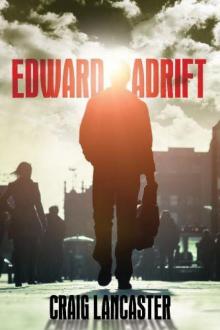 Edward Adrift
Edward Adrift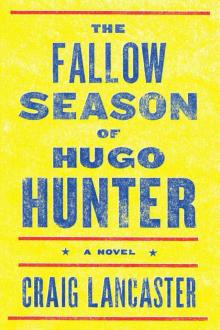 The Fallow Season of Hugo Hunter
The Fallow Season of Hugo Hunter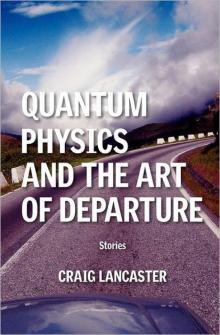 Quantum Physics and the Art of Departure: Short Shories
Quantum Physics and the Art of Departure: Short Shories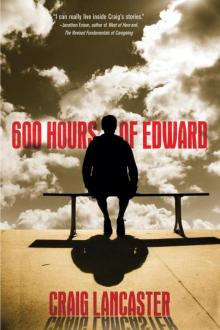 600 Hours of Edward e-1
600 Hours of Edward e-1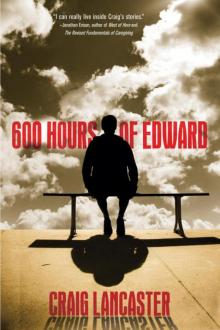 600 Hours of Edward
600 Hours of Edward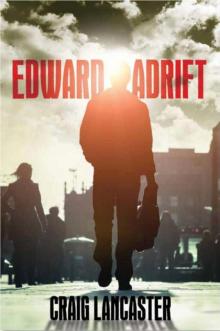 Edward Adrift e-2
Edward Adrift e-2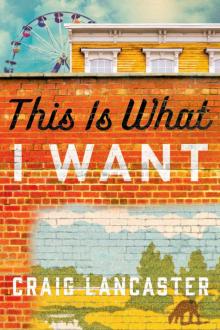 This Is What I Want
This Is What I Want